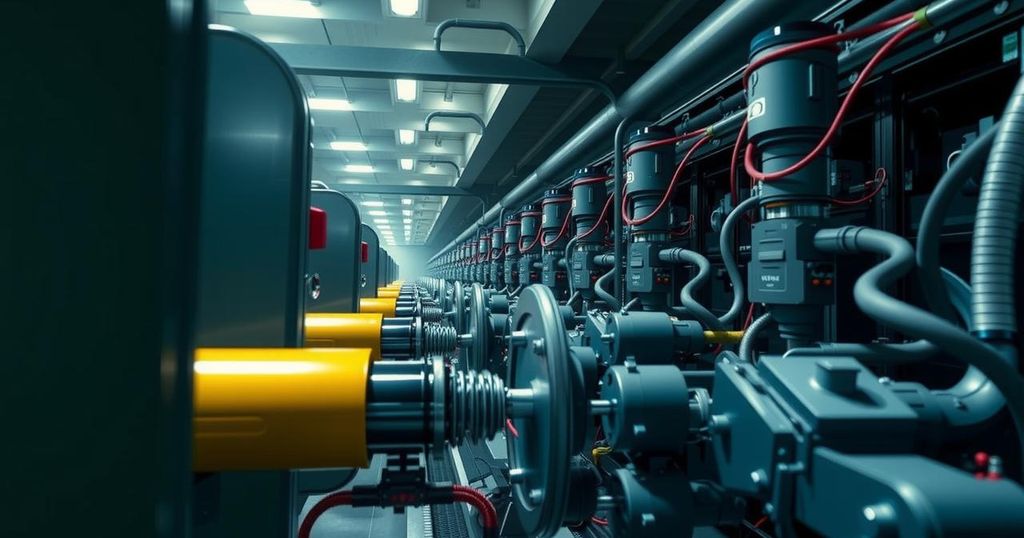Global news
ASIA, ATOMIC ENERGY ORGANIZATION, CNN, ECONOMIC SANCTIONS, FOREIGN MINISTRY, GIDEON SA, GIDEON SA ’ AR, IAEA, INTERNATIONAL ATOMIC ENERGY AGENCY, INTERNATIONAL RELATIONS, IRAN, IRNA, ISRAEL, MIDDLE EAST, MINISTRY, NUCLEAR POLICY, NUCLEAR WEAPONS, RAFAEL MARIANO GROSSI, REUTERS, SANCTIONS, TEHRAN, UN, UNITED NATIONS, US
Leila Ramsay
0 Comments
Iran Activates New Centrifuges Amid UN Nuclear Watchdog Criticism
Iran has activated new advanced centrifuges for uranium enrichment in response to UN criticism regarding its nuclear program. Despite repeated denials of ambitions for nuclear weapons, concerns about Iran’s nuclear capabilities are rising, particularly following the IAEA’s recent resolution urging stricter compliance and cooperation. The geopolitical landscape remains tense as global powers monitor Iran’s actions closely.
On Friday, Iran announced the activation of new advanced centrifuges for its nuclear program, following criticism from the United Nations’ nuclear watchdog regarding its lack of cooperation. The Iranian state news agency, IRNA, reported that these advanced centrifuges would serve to protect the country’s interests and further develop its peaceful nuclear energy capabilities, which Iran asserts are aligned with its national rights. Despite recurrent denials of intending to develop nuclear weapons, this step heightens concerns over Iran’s potential nuclear capabilities.
The United Nations International Atomic Energy Agency (IAEA) recently adopted a resolution urging Iran to enhance its cooperation with the agency, which highlighted longstanding disputes over unreported uranium traces found at undeclared sites. Iran dismissed the resolution as being politically motivated and an outcome of pressure from the United States and three European nations, asserting it would continue cooperating with the IAEA as agreed.
The backdrop of this development is Iran’s gradual retreat from commitments made in the 2015 nuclear agreement, especially following the United States’ withdrawal and subsequent sanctions. Iran’s foreign ministry had previously warned that reactions of sufficient magnitude could be anticipated if pressures persisted. Meanwhile, the IAEA’s director general indicated that Iran currently possesses enough uranium enriched to near-weapons-grade levels to potentially manufacture several nuclear bombs, contributing to regional and international concerns.
Israel’s Defense Minister acknowledged the IAEA’s resolution and emphasized that preventing Iran’s nuclear ambitions is essential for global security. As the nuclear discourse continues, scrutiny over Iran’s nuclear activities is expected to intensify, particularly in light of recent developments that have significantly altered the geopolitical landscape.
Iran’s nuclear program has been a source of contention and concern for the international community, particularly following the United States’ withdrawal from the Joint Comprehensive Plan of Action (JCPOA) in 2018. The 2015 nuclear deal limited Iran’s capabilities in operating advanced centrifuges to ensure that its nuclear energy program remained peaceful. However, following the imposition of economic sanctions by the United States, Iran began to scale back its commitments. The IAEA has been monitoring Iran’s nuclear activities closely, suspecting possible undeclared nuclear materials, amidst increasing tensions surrounding Iran’s potential to develop nuclear weapons.
In summary, Iran’s recent activation of advanced centrifuges signals a defiance against the UN’s calls for greater cooperation and adds to the ongoing concerns regarding its nuclear program. While Iran maintains that its nuclear pursuits are purely for peaceful purposes, the geopolitical implications of its actions, particularly in relation to the IAEA’s findings and the responses from global powers, could have far-reaching consequences. Continued vigilance and diplomatic efforts remain crucial in addressing the complexities of the situation.
Original Source: www.cnn.com




Post Comment